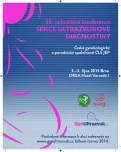-
Medical journals
- Career
Prenatal diagnosis of skeletal dysplasia in first trimester of pregnancy
X-linked dominant chondrodysplasia punctata
Authors: P. Polák 1; A. Baxová 2; A. Křepelová 3; M. Balák 4
Authors‘ workplace: Centrum prenatální diagnostiky U. S. G. POL, s. r. o., Olomouc, ved. lékař MUDr. P. Polák, CSc. 1; Ústav biologie a lékařské genetiky 1. LF UK a VFN, Praha, přednostka doc. MUDr. M. Kohoutová, CSc. 2; Ústav biologie a lékařské genetiky 2. LF UK a FN Motol, Praha, přednosta prof. MUDr. M. Macek Jr., DrSc. 3; MUDr. Martin Balák, s. r. o., soukromá gynekologická ambulance, Prostějov 4
Published in: Ceska Gynekol 2014; 79(3): 193-197
Overview
Case report describes successful prenatal diagnosis of skeletal dysplasia in the first trimester of pregnancy in a female patient affected with X-linked dominat chondrodysplasia punctata (CDPX2). Her first pregnancy was terminated in the second trimester due to skeletal dysplasia of the foetus. The diagnosis in the following pregnancy was finished in the first trimester – before the end of the 13th gestational week. The diagnosis was established on the basis of ultrasonographic (US) examination and mutation analysis of the EBP gene in the material of chorionic villus sampling (CVS). Keywords: prenatal diagnosis, ultrasonograpy, X-linked dominant chondrodysplasia punctata, DNA analysis
Sources
1. Andersen, PE. Jr., Justensen, P. Chondrodysplasia punctata. Skeletal Radiol, 1987, 16, p. 233–236.
2. Baker, ER., Goldberg, MJ. Diagnosis and management of skeletal dysplasias. Semin Perinatol, 1994, 18, p. 283–291.
3. Borenstein, M., Persico, N., Kaihura, C., et al. Frontomaxillary facial angle in chromosomally normal fetuses at 11+0 to 13+6 weeks. Ultrasound Obstet Gynecol, 2007, 30(5), p. 737–741.
4. Guzman-Huerta, ME., Morales, AS., Benavides-Serralde, A., et al. Prenatal prevalence of skeletal dysplasias and proposal ultrasonographic diagnosis approach. Rev Invest Clin, 2012, 64, p. 429–436.
5. Hatzaki, A., Sifakis, S., Apostolopoulou, D., et al. FGFR3 related skeletal dysplasias diagnosed prenatally by ultrasonography and molecular analysis: presentation of 17 cases. Am J Med Genet A, 2011, 155A, p. 2426–2435.
6. http://www.omim.org/search?index=entry&sort=score+desc%2C+prefix_sort+desc&start=1&limit=10&search=conradi-hunermann+syndrome
7. Janovic, D., Dřímal, I., Hromec, I., et al. K problematice chondrodysplasia punctata. Acta Chir Orthop Traumatol Czech, 1990, 7, s. 256–264.
8. Kozlowski, K., Basel, D., Beighton, P. Chondrodysplasia punctata in siblings and maternal lupus erythematosus. Clin Genet, 2004, 66, p. 545–549.
9. Kozlowski, K., Godlonton, J., Gardner, J., Beighton, P. Lethal non-rhizomelic dysplasia epiphysealis punctata. Clin Dysmorphol, 2002, 11, p. 203–208.
10. Makrydimas, G., Souka, A., Skentou, H., et al. Osteognesis imperfecta and other skeletal dysplasias presenting with increased nuchal translucency in the first trimester. Am J Med Genet, 2001, 98(2), p. 117–120.
11. Martanová, H., Křepelová, A., Baxová, A. X-linked dominant chondrodysplasia punctata (CDPX2): multisystematic impact of the defect in cholesterol biosynthesis. Prague Med Rep, 2007, 108, p. 263–269.
12. Nemec, SF., Nemec, U., Brugger, PC., et al. Skeletal development on fetal magnetic resonance imaging. Top Magn Reson Imaging, 2011, 22, p. 101–106.
13. Ngo, C., Viot, G., Aubry, MC., et al. Firts-trimester ultrasound diagnosis of skeletal dysplasia associated with increased nuchal translucency thickness. Ultrasound Obstet Gynecol, 2007, 30(2), p. 221–226.
14. Nyberg, DA., McGahan, JP., Pretorius, DH., Pilu, G. Diagnostic imaging of fetal anomalies. Philadelphia: Lippincot Williams and Wilkins, 2003, p. 661–713.
15. Souka, AP., von Kaisenberg, CS., Hyett, JA., et al. Increased nuchal translucency with normal karyotype. Am J Obstet Gynecol, 2005, 192(4), p. 1005–1021.
16. Vimercati, A., Panzarino, M., Totaro, I. Increased nuchal translucency and short femur length as possible early signs of osteogenesis imperfecta type III. J Prenat Med, 2013, 7, p. 5–8.
17. Vseticka, J., Gattnarova, Z., Marik, I., et al. Ultrasound diagnosis of severe mesomelic dysplasia in two fetuses associated with increased neck translucency and tetralogy of Fallot in one and cystic hygroma in the other. Am J Med Genet A, 2010, 152A, p. 815–818.
18. Yeh, P., Saeed, F., Paramasivan, G., et al. Accuracy of prenatal diagnosis and prediction of lethality for fetal skeletal dysplasias. Prenat Diagn, 2011, 31, p. 515–518.
19. Žižka, J. Diagnostika syndromů a malformací. Praha: Galén, 1994, s. 134–135.
Labels
Paediatric gynaecology Gynaecology and obstetrics Reproduction medicine
Article was published inCzech Gynaecology

2014 Issue 3-
All articles in this issue
- The INKA Program – “tailor-made” obstetric analgesia
-
Why do we still hesitate to accept the new international criteria for the diagnosis of gestational diabetes mellitus?
The current screening is non-uniform and does not correspondwith evidence-based medicine - The alarming incidence of gestational diabetes mellitus using currently used and new international diagnostic criteria
- HELLP syndrome complicated by liver rupture – case report
-
Importance of outpatient ultrasonografically guided transvaginal hydrolaparoscopy in the decision algorithm of care for the infertile couple.
The results of the Centre for Assisted Reproduction Gennet Liberec 2012–2013 - Diagnostic algorithm in pregnancies of uncertain viability or unknown location – a review of the latest recommendations
- Myo-inositol in the treatment of polycystic ovary syndrome
- Evolution of peripartal hysterectomy at our department – five years evaluations
- Hormonal replacement therapy by patientsafter treatment for gynecological cancer
- Thrombotic microangiopathy in pregnancy complicated by acute hemorrhagic-necrotic pancreatitis during early puerperium
-
Prenatal diagnosis of skeletal dysplasia in first trimester of pregnancy
X-linked dominant chondrodysplasia punctata - Sclerosis tuberosa and pregnancy
- Czech Gynaecology
- Journal archive
- Current issue
- Online only
- About the journal
Most read in this issue- Diagnostic algorithm in pregnancies of uncertain viability or unknown location – a review of the latest recommendations
- Myo-inositol in the treatment of polycystic ovary syndrome
-
Prenatal diagnosis of skeletal dysplasia in first trimester of pregnancy
X-linked dominant chondrodysplasia punctata - HELLP syndrome complicated by liver rupture – case report
Login#ADS_BOTTOM_SCRIPTS#Forgotten passwordEnter the email address that you registered with. We will send you instructions on how to set a new password.
- Career

